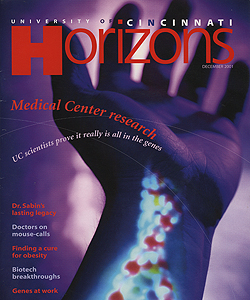by Deborah Rieselman
The word "surgery" hung in the air. Christine could virtually see the letters floating out of her doctor's mouth, like a warped cartoon missing the punch line. Although the man in the lab coat continued to talk, Christine began drifting into a Charlie Brown world, one where the authority figure speaks without syllables or consonants.
She may have nodded her head, but she heard nothing. Not really. Not until the doctor asked, for the third time, if she had any questions. Then she quietly shook her head. The doctor mistakenly assumed she understood. In reality, she didn't know where to begin.
Within a few hours the questions started. One after another. Coming so fast she couldn't remember if they were new ones or repeat customers.
Fortunately, someone explained that she had a wise friend closer than she knew. Just a keystroke away, more than 200 medical experts, including some of the country's best, were available to answer questions any time of day or night, thanks to the University of Cincinnati.
NetWellness is a nationally acclaimed interactive Web site of consumer health information. Begun as a University of Cincinnati experiment in '94, it attracts more than a million "hits" a month, has answered more than 17,000 questions from individuals this year alone and has grown into a comprehensive collaboration with the state's three Carnegie Doctoral/ Research I Institutions, Case Western Reserve University and Ohio State University.
More than a dozen professional and consumer organizations have bestowed accolades on the digital endeavor: Forbes declared it one of the six best health Web sites, and U.S. News & World Report named it one of the top 10 Web sites hosted by a college of medicine. "NetWellness," the Cincinnati Post wrote, "ranks with the Mayo Clinic and Johns Hopkins sites as being among the premier health information sites. And one of the most ambitious."
Last year, the site logged in 10 million hits. What kept people coming back? Some praised its "comforting" information. Others commented on the way it "gave us hope," "gave me the courage to seek treatment" and "put my mind to rest."
"Your answer was a relief and a blessing," one person wrote. "This service is fantastic." Former Ohio Gov. George Voinovich summed it up best when he said, "NetWellness is going to save people's lives."
With that in mind, the state of Ohio funds most of the site's $900,000 budget. The price is a bargain when one realizes that physicians who routinely bill at $250 an hour provide pro bono services, points out Steve Marine, director of outreach for the Medical Center's Academic Information Technology and Libraries (AIT&L), which oversees the site. When the worth of those consultations is calculated, the site's value more than doubles its budget, he estimates.

 Past Issues
Past Issues
